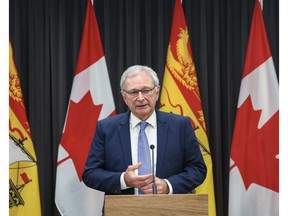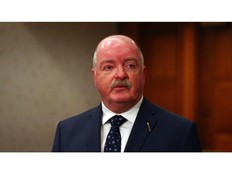For a first time, Higgs budget faces criticism from the right
Right-leaning think tanks, credit agencies that have praised Higgs government’s fiscal prowess for last half decade now aren’t as happy

Article content
The right-leaning think tanks and credit agencies that have praised the Higgs government’s fiscal prowess for the last half decade now aren’t as happy, instead raising questions of what the latest budget could have been.
It’s a surprise turn of events, as Premier Blaine Higgs has persistently faced pressure throughout his government’s tenure from left-leaning political opponents and a wide range of social groups to do more.
And while that still persists, Higgs is now facing questions from the fiscally conservative crowd over a different set of shortcomings.
“I do think there was a missed opportunity to restrain spending and introduce meaningful tax relief,” Alex Whalen, associate director with the Fraser Institute, said in an interview.
“It’s really important for people to understand that New Brunswick has a real opportunity to reduce taxes that is not available to its neighbouring provinces.”
He later added: “I was surprised that the budget didn’t include anything.”
It was a sentiment echoed by the Canadian Taxpayers Federation, which applauded the Higgs government’s sixth consecutive balanced budget, but only while urging the government to also deliver tax relief and exercise more spending restraint.
“This budget is balanced on a knife’s edge because of $1.1 billion in new spending,” said the federation’s interim Atlantic director Jay Goldberg. “Had Premier Blaine Higgs kept spending growth at the rate of inflation, New Brunswickers could have gotten hundreds of millions of dollars in tax relief.
“Instead, Higgs chose to increase spending by nine per cent over 2023 levels and taxpayers were left out in the cold.”
The Higgs government’s budget projects roughly $600 million in new revenue in the year ahead.
It’s a significant figure underscoring a major amount of fiscal room when considered on top of the $247.4 million surplus in the fiscal year that just ended.
What right-leaning commentators see is a government that has three quarters of a billion dollars at its disposal if it simply held the line on spending.
But the new budget also forecasts an added $800 million in expenses that is also above the $300 million it ran over budget last year.
It’s a part of the new Higgs government’s fiscal plan that even has a key credit rating agency, one that has fawned over the Higgs government and its ability to decrease the provincial debt by more than $2 billion, now doubting the path ahead.
“New Brunswick is the only Canadian province to consistently post balanced budgets since 2018, including during the volatile and uncertain years of the pandemic,” Moody’s associate managing director Michael Yake writes in a new report on the budget.
“This track record was achieved by controlling spending growth which was below revenue growth.
“However, this relationship of growth rates seems to be diverging in the current budget where spending is growing faster than revenue. This exposes the province to two key risks for 2024, namely a slowing economy and increased demand for spending on social programs.”
Moody’s believes that an unforeseen challenge – either through lower immigration levels, weaker employment levels, lower household spending or private investment – could now threaten the government’s flawless string of surpluses.
But Moody’s may be alone in that worry.
DBRS Morningstar, another rating agency the Higgs government often quotes, says it “believes that projected modest economic growth will be sufficient to offset the rise in debt arising from planned capital investments.”
In a report following the budget, it underscores the Higgs government’s history of “steady underlying fiscal metrics.”
In an interview, DBRS vice president of public finance Aditi Joshi said she is “not particularly concerned” with the Higgs government’s modest surplus projection.
Asked what’s the most significant pressure facing the provincial fiscal standing, Joshi said it was a looming provincial election, and particularly a regime change.
“Some of the uncertainty could arise from the next general election,” she said.
“And if there were to be a change in government, it’s too early for us to say whether an incoming government would have the same approach to fiscal sustainability.”
What both bond raters and conservative groups are now watching closely for is what comes next, particularly making note of what Finance Minister Ernie Steeves hinted at in speaking with reporters this past week.
“There is still talk all the time of more ways we can (help),” Steeves said in answering questions as to why the budget was without a tax cut or other significant cost of living move.
“We just got this budget finished, we’re just presenting it today, but yesterday I was talking to some staff about another tax cut, or at least a way to help all classes of New Brunswickers.”
Whalen said those words are what he will now focus on.
“Tax relief may come down the road based on the comments by the finance minister, but at least as far as the budget there wasn’t much on that topic,” Whalen said. “The finance minister’s comments about tax cuts certainly leaves me wondering what’s to come.”












Postmedia is committed to maintaining a lively but civil forum for discussion. Please keep comments relevant and respectful. Comments may take up to an hour to appear on the site. You will receive an email if there is a reply to your comment, an update to a thread you follow or if a user you follow comments. Visit our Community Guidelines for more information.